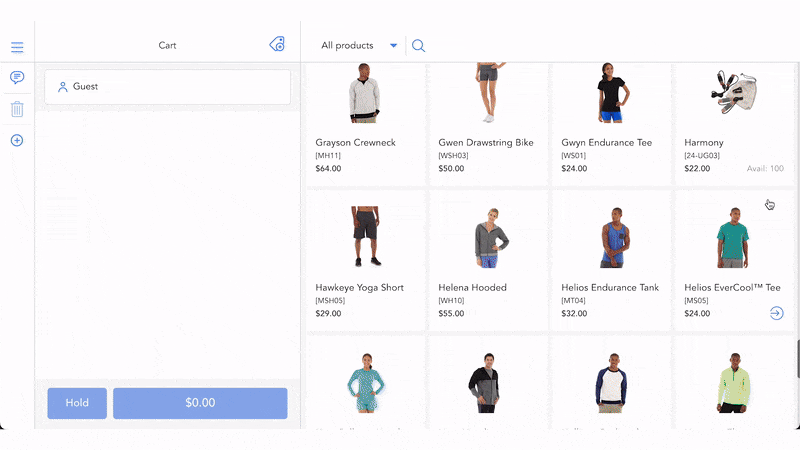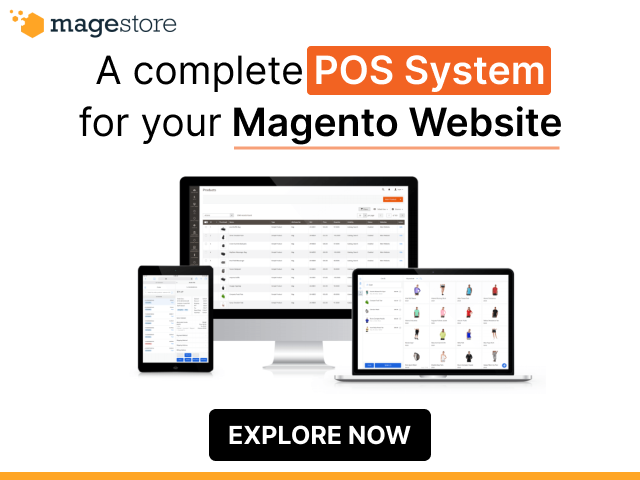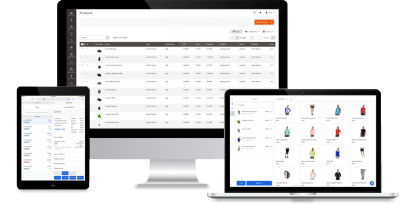Magento EPOS for retail is an electronic point of sale (POS) solution that connects your Magento (Adobe Commerce) with brick-and-mortar shops. It enables Magento retailers to manage both online and offline transactions, synchronise product data, track inventory across stores, and deliver a consistent shopping experience whether a customer buys online, in person, or on the go.
In the UK, when searching for an EPOS solution for Magento, you’ll likely come across five leading names – Magestore, Ebizmarts, Webkul, Epos Now, and Epos Direct.
To help you get a clear overview and choose the best Magento EPOS for your store, we’ve analysed and compared these solutions based on key factors such as business size, Magento integration depth, features, pricing, support quality, third-party integration capability, and scalability.
Take 5 minutes to see which EPOS software fits your shop best – you might be surprised how easy it is to find the right one!
Key takeaways
- Explore the top 5 EPOS for Magento in the UK, including Magestore POS, Ebizmarts POS, Webkul POS, Epos Now, and Epos Direct, across key factors such as features, pricing, support, and user ratings
- A low starting price on an EPOS plan doesn’t always mean good value; don’t forget to check what features and support are included
- Consider business type, features, pricing, support, and reviews for an optimal Magento EPOS selection

What makes a great EPOS for Magento in the UK
The right Magento EPOS isn’t just about features – it’s about how well the system fits UK retail standards and business operations.
UK retailer characteristics
UK retailers typically:
- Operate multiple outlets and tills: PwC and Green Street reported that over 206,000 multi-store retail chains (with at least five locations) were operating across Great Britain in the first half of 2024 – accounting for approximately 63.4% of the UK’s total 324,995 retail businesses as of January 2024, according to the UK Parliament.
- Follow strict VAT and HMRC compliance: The UK uses multiple VAT rates: 0% (for most food and children’s clothes), 5% (for children’s car seats and home energy, smoking cessation products, etc.), and 20% (for most food and services).
- HMRC requires VAT-registered retailers to comply with stringent VAT record-keeping rules:
- Keep digital VAT records for all sales and purchases using software that supports Making Tax Digital (MTD).
- Record for each transaction: date of supply, value excluding VAT, and VAT rate applied.
- Record Daily Gross Takings (DGT) if using a retail VAT scheme.
- Maintain digital links between systems (no manual copy-paste) to ensure data integrity.
- Retain VAT records for at least 6 years for compliance and audits.
- Serve a contactless-first market: According to Barclays, 94.6% shoppers used contactless payments in-store in 2024, making it one of the must-have payment methods in the UK.
- Work in environments with variable internet reliability: In the UK, pop-up stores have become a common part of the retail scene, offering flexible, short-term formats that adapt to changing trends. The sector is expanding rapidly – growing 12.3% each year and adding £2.3 billion to the UK economy.
- Utilize diverse hardware setups: UK retailers employ a mixed setup, comprising iPads, tablets, PCs, scanners, and cash drawers. Compatibility prevents costly hardware replacement and ensures the use of PCI-approved devices.
10 Must-have features:
We evaluated Magento 2 EPOS features based on business needs, and here is what you should expect in your EPOS system for Magento.
- Accurate and real-time synchronisation with Magento: Maintain consistent customer information, pricing, product attributes, sales, and stock levels across all channels.
- Smooth integration with payment gateways: Connect with Stripe, Square, Adyen, Worldpay, and other gateways for PCI compliance, faster checkout, and easier reconciliation.
- Multiple payment methods: Accept Chip & PIN, contactless, Apple Pay, Android Pay, gift cards, and other digital wallets.
- VAT and tax-rate handling and HMRC compliance: Set tax rules per product or location, handle returns and refunds correctly, and generate appropriate compliance reports.
- Offline mode: Continue processing transactions even when connectivity is down and automatically sync data later.
- Hardware flexibility and compatibility: The POS should support Bluetooth, Ethernet, USB, or Wi-Fi connections, ensuring seamless communication between terminals and peripherals regardless of device type or brand.
- Multi-location support: Manage multiple tills, outlets, and stock transfers from a single dashboard.
- Stock control and inventory management: Track stock across stores and warehouses, support inventory transfer, barcode scanning, and management of bundle or kit items.
- Security and access control: Assign access by staff roles, secure sensitive data, support PCI compliance, enable audit logs, and enforce password control.
- Reporting and analytics: Generate reports on sales, staff performance, profit margins, and returns for better decision-making and financial accuracy.
5 Nice-to-have features:
- Omnichannel fulfillment: Enable click-and-collect, ship-from-store, reserve-in-store, and in-store pickup for online orders.
- Customer loyalty: Offer reward points, gift cards, store credits, and membership tiers to encourage repeat purchases.
- Promotions, discounts, and tier pricing: Apply in-store discounts, promotions to customer groups, or manage tiered pricing structures (e.g., student discounts, VIP tiers).
- Customisation: Tailor the EPOS to match your unique workflows or industry needs, from niche sectors like furniture and boutique retail to regulated or high-risk industries such as vape, alcohol, adult, cannabis, and firearms.
- Scalability: Support thousands of SKUs, multiple stores, and high transaction volumes without performance lag as your business grows.
Comparison table: 5 Best EPOS systems in the UK
Magestore | Ebizmarts | Webkul | Epos Now | Epos Direct | |
Magento-native EPOS (i.e. direct integration) | Yes | Yes | Yes | No, via third-party connector | No, via plugin or integration |
Magento edition support | Magento Open Source and Adobe Commerce | Magento Open Source and Adobe Commerce | Magento Open Source and Adobe Commerce | Magento Open Source | Magento Open Source and Adobe Commerce |
Compatible device | iPads, tablets, laptops, Macs, and PCs | Only iPad models running the minimum iOS 12 | Tablets, iPads, laptops, PCs, and Macs | iPad, Android, PC, or Apple Mac | Window PCs |
Customisation (This is evaluated by:
| High | Medium | Medium | Limited | Limited |
Scalability (This is evaluated by
| High | Medium | Medium | Medium | Limited |
Feature checklist *This checklist only highlights the features included in the POS solutions. You should review the detailed comparison section below to see how powerful or advanced each feature is. | Must-have features Real-time synchronisation with Magento Integration with payment gateways Multiple payment methods VAT and tax-rate handling and HMRC compliance Offline mode Hardware compatibility Multi-location support Stock and inventory management Security and access control Reporting and analytics Nice-to-have features Omnichannel fulfillment Customer loyalty Promotions, discounts, and tier pricing Customisation Scalability | Must-have features Real-time synchronisation with Magento Integration with payment gateways Multiple payment methods VAT and tax-rate handling and HMRC compliance Offline mode Hardware compatibility Multi-location support Stock and inventory management Security and access control Reporting and analytics Nice-to-have features Omnichannel fulfillment Customer loyalty Promotions, discounts, and tier pricing Customisation Scalability | Must-have features Real-time synchronisation with Magento Integration with payment gateways Multiple payment methods VAT and tax-rate handling and HMRC compliance Offline mode Hardware compatibility Multi-location support Stock and inventory management Security and access control Reporting and analytics Nice-to-have features Omnichannel fulfillment Customer loyalty Promotions, discounts, and tier pricing Customisation Scalability | Must-have features Real-time synchronisation with Magento Integration with payment gateways Multiple payment methods VAT and tax-rate handling and HMRC compliance Offline mode Hardware compatibility Multi-location support Stock and inventory management Security and access control Reporting and analytics Nice-to-have features Omnichannel fulfillment Customer loyalty Promotions, discounts, and tier pricing Customisation Scalability | Must-have features Real-time synchronisation with Magento Integration with payment gateways Multiple payment methods VAT and tax-rate handling and HMRC compliance Offline mode Hardware compatibility Multi-location support Stock and inventory management Security and access control Reporting and analytics Nice-to-have features Omnichannel fulfillment Customer loyalty Promotions, discounts, and tier pricing Customisation Scalability |
Free trial | 7-day free trial with POS Lite | No | No | 30-day free trial | 30-day free trial |
Pricing plan *When comparing prices, you should check the features and support included. |
|
|
|
|
|
Support |
|
|
|
|
|
Rating on Trustpilot | 4.8 | 3.4 | 4.7 | 4.5 | 3.9 |
5 Best Magento EPOS systems in the UK for 2026: Detailed comparison
1. Magestore POS: No.1 all-in-one EPOS solution for Magento retailers and multi-shop operations needing deep Magento configuration, inventory control, and flexibility
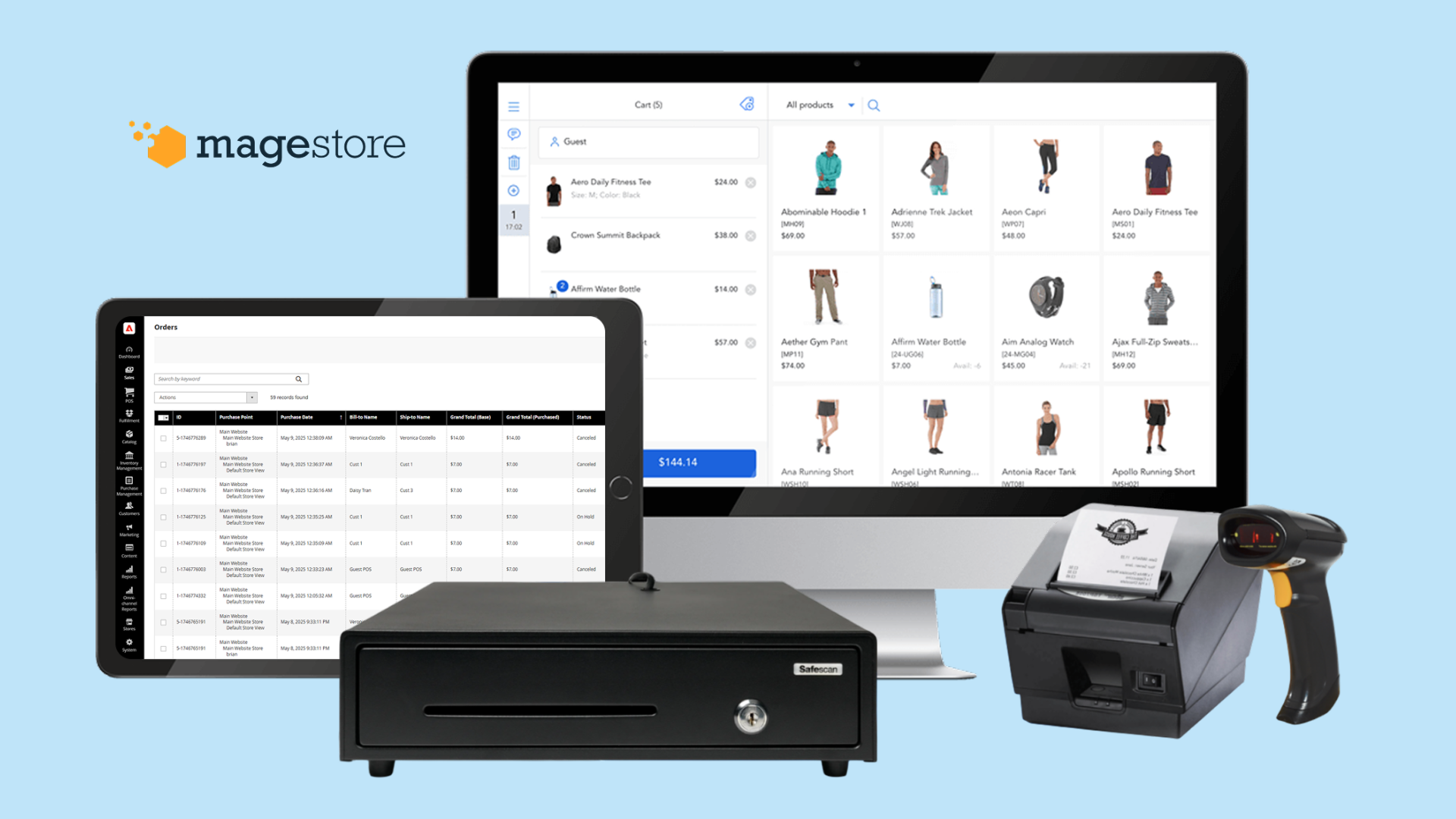
Magestore POS is a Magento-native EPOS for retailers who sell both online and offline. To deliver a seamless omnichannel experience, it syncs inventory, orders, and customer data in real time across all sales channels, from shop floors, pop-up shops, and franchises to the Magento website and marketplaces.
With its customizable interface, powerful inventory control, barcode management, omnichannel fulfillment, and flexible hardware compatibility, Magestore POS helps retailers streamline operations and grow without limits.
Features
- Sync products, orders, customers, and stock between Magento and physical stores with 100% accuracy and in real time
- Continue operations even if the internet goes down
- Assign user roles, staff, and permissions to control access and performance
- Follow Magento rules, apply advanced pricing rules, tier pricing, and customer-specific discounts at checkout
- Manage omnichannel loyalty programs (reward points, gift cards, and store credits)
- Process returns, exchange, and refunds seamlessly across all sales channels
- Fulfill in-store and Magento orders with click-and-collect, ship-from-store, backorder, and dropshipping
- Track stock, move stock, audit, and forecast inventory across multiple stores and warehouses and print barcode labels
- Support the latest versions of Magento Open Source and Adobe Commerce
- Handle unlimited products and SKUs and multiple store locations from a single platform
- Provide comprehensive reporting of sales (by time-frame, coupon, country, customer, product, payment, etc), POS (location, staff, session, payment method), and inventory (stock value, stock detail, income stock, etc.)
- Integrate with leading payment gateways, including Stripe, Square, Adyen, Authorize.net, WorldPay, Global Payments, etc., for secure, flexible transactions
- Integrate with 3rd-party software to streamline operations, including ERP, accounting software, shipping platforms, etc.
Pros
- Directly integrate with Magento, no middleware needed
- Sync data 100% real-time and accurately with Magento
- Operate stably with 99% uptime, handling 320,000+ orders, 320,000+ SKUs, 200+ stores, and 400+ staff. Actual POS performance may vary depending on your server configuration.
- Pay once for a lifetime POS Commerce license and eliminate monthly subscription fees
- Get a 90-day refund policy and free 1-year support with a POS Commerce licence
- Enjoy a user-friendly interface that’s easy for staff to learn and use
- Manage multi-shop and retail chains effectively with advanced POS features, such as role-based permissions, inventory transfer, supplier management, etc., and full Magento MSI support
- Run the system on all iPads, laptops, PCs, and tablets
- Support plug-and-play connections to printers, scanners, cash drawers, and card readers via USB, Bluetooth, or LAN
- Support compatibility with popular Mac, PC, iPad, and Android tablets
- Leverage Magento’s open-source framework to customise and scale the POS system according to your specific business requirements
- Allow unlimited locations (for POS Lite), POS users, and tills (for both POS Lite and POS Commerce) with no extra costs
- Receive consistent and quick support from a dedicated team, ensuring your requirements and information aren’t lost in handovers.
Cons
- Magestore Magento POS Commerce setup is more technical than plug-and-play systems because it’s built to run natively on Magento. The installation process connects the POS to Magento’s APIs and data structures, requiring alignment with existing extensions. Once configured, the system achieves seamless real-time updates and stable performance across sales channels.
Recommended for
Medium-to-large Magento merchants with physical stores (or plan to scale)
- Want to manage multiple SKUs, locations, and high transaction volumes
- Require tight integration with Magento to sync data across sales channels accurately and instantly
- Prefer to self-manage the entire POS system, including both data and software
2. Ebizmarts POS – A mobile POS for small to mid-size stores that want an easy iPad-based checkout
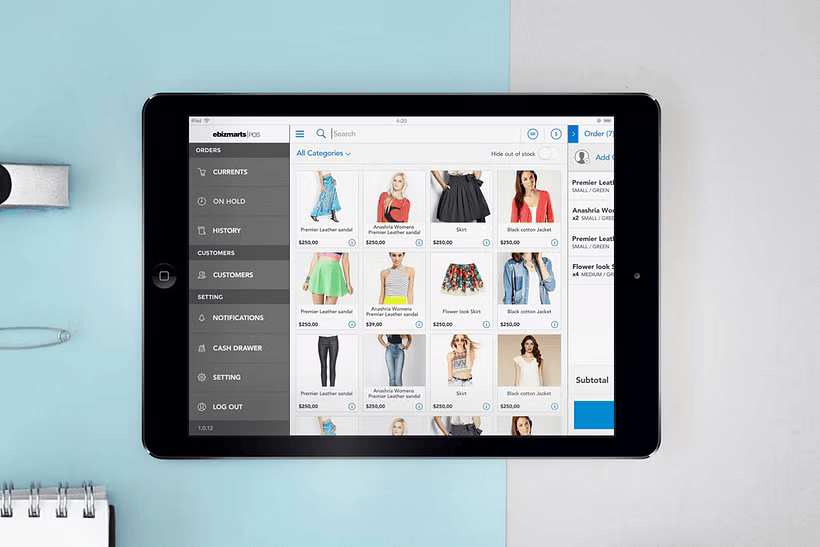
Ebizmarts POS is a mobile-first iPad application for the Magento ecosystem to empower retail stores to sell the same products, apply the same pricing, manage customers, and handle orders that live in Magento.
Features
- Integrate natively with Magento to sync products, customers, and orders in real time
- Manage omnichannel fulfillment in a unified order view, with click and collect and ship-from-store
- Apply advanced pricing rules, tier pricing, and customer-specific discounts at checkout
- Access and manage shared customer profiles across both online and offline channels
- Configure multiple tax levels and support transactions in various currencies
- Scan barcodes to find products for fast, accurate checkout
- Process returns and refunds seamlessly across all sales channels
- Print or email receipts to customers instantly to enhance checkout convenience
- Assign user roles and permissions to control cashier access and security
Pros
- Set up quickly with a simple, hassle-free installation process
- Test the system easily through a free demo account
- Run a Magento-native EPOS without relying on third-party integrations
- Customise the EPOS interface and workflows to fit your business needs
- Integrate seamlessly with Mailchimp for free to enhance your marketing
- Access responsive, local support tailored for UK-based merchants
Cons
- Operate only on iOS devices, limiting POS device options
- Only offer POS storefront features, such as checkout, order creation, and customer management at the counter, without advanced backend management capabilities like inventory, fulfillment, and purchasing management
- Charge fees for additional devices
- Integrate solely with select payment gateways, including Sage Pay, Adyen, Authorize.net, PayPal Here, and Payment Express
- Require a third-party gift card extension for POS gift card functionality
- Provide customer support only via email
Recommended for
- Magento retailers seeking a native iPad experience with smooth Magento sync and UK local support
3. Webkul – An affordable EPOS module for small to mid-size Magento retailers seeking an easy setup
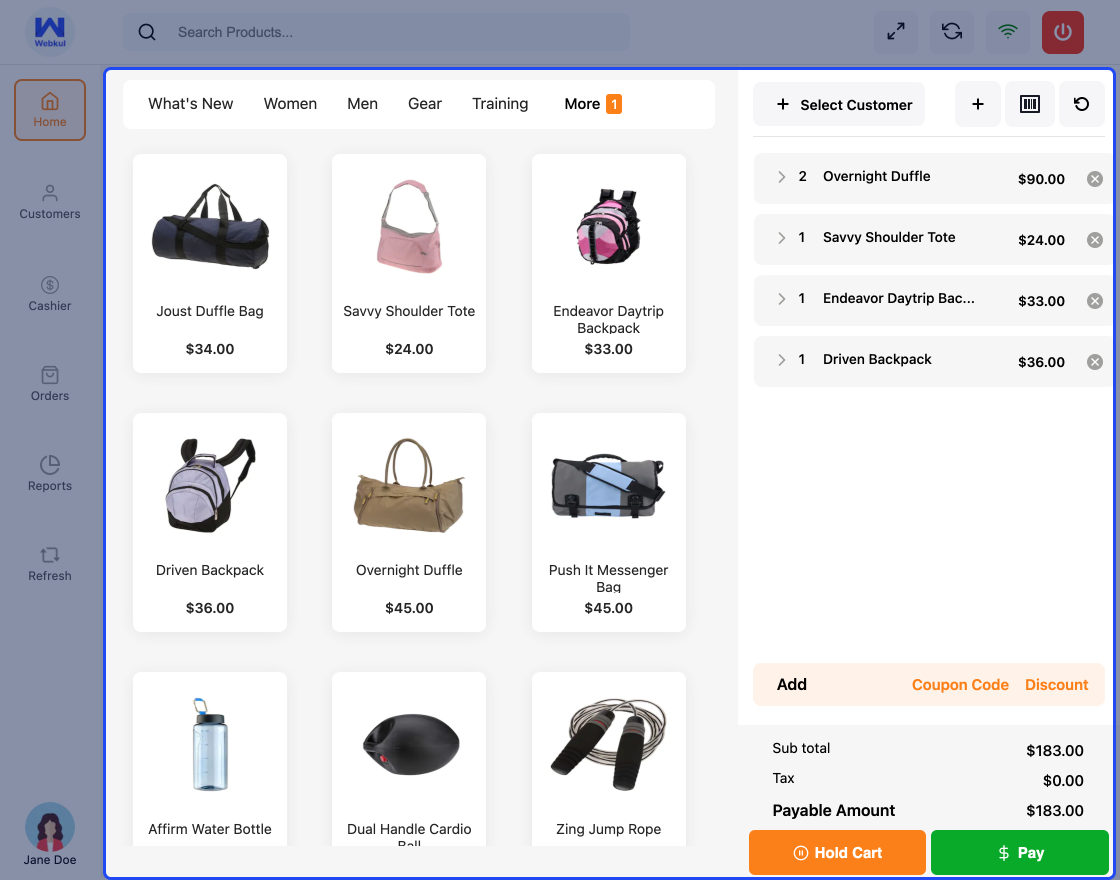
Webkul offers two versions of their EPOS – a web-based POS and a mobile POS app for Magento. This module is primarily designed for small to medium-sized Magento businesses, providing basic EPOS functions like checkout, inventory tracking, and offline selling.
However, retailers seeking more advanced features, such as inventory control, loyalty programs, or omnichannel fulfillment, will need to purchase additional Webkul Magento extensions to extend the EPOS’s functionality.
Features
- Sync orders, products, and customers between Magento and POS
- Operate in offline mode, allowing sales to continue even during connectivity issues
- Assign cashiers and sales agents to multiple outlets
- Scan barcodes or search by SKUs to add products to the cart for faster checkout
- Manage customer profiles across online and offline channels
- Provide outlet reporting details, including Revenue, Tax, Shipping, and Quantity
Pros
- Offer an affordable entry price for small Magento retailers
- Offer an easy setup process for quick implementation
- Provide free 3-month support for all EPOS packages
- Offer both POS and admin free demos for easy testing
Cons
- Display an out-of-date user interface
- Sync data with delays instead of real-time updates
- Support only basic selling functions like checkout and simple configuration
- Require purchase of additional modules or extensions to access advanced features like loyalty programmes, full inventory control, and reports
Recommended for
- Magento merchants who need to handle fewer than 100 daily orders
4. Epos Now
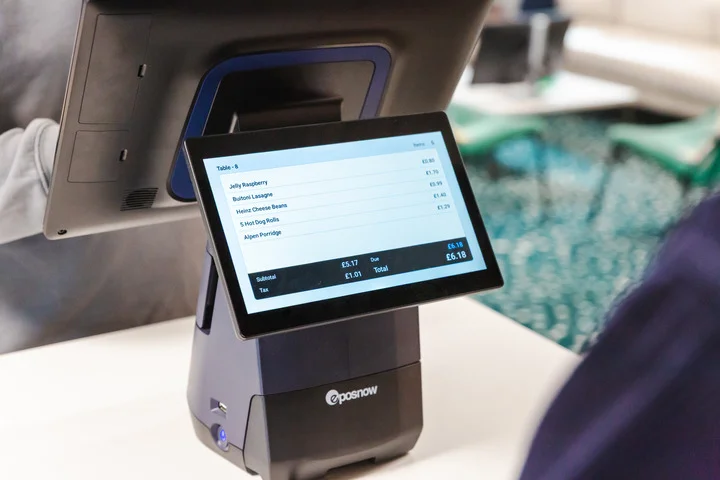
EPOS Now is a cloud-based EPOS system designed for retail, hospitality, and multi-location operations in the UK. It offers hardware bundles, integrated payments, and an app store of extensions. Epos Now provides open APIs to integrate with eCommerce platforms; however, to transfer data between Epos Now and Magento, retailers need third-party connectors, like Wrightway Digital.
Features
- Manage stock and outlets with real-time reporting on sales, margin, and inventory from any device
- Accept payments through multiple methods, including card, contactless, wallet, and online
- Connect to a variety of apps, such as accounting, eCommerce, marketing, and more, via an AppStore ecosystem with 100+ apps
- Operate offline or with 4G backup so transactions continue even when the internet is down
- Customise receipts, promotions, and staff roles for retail workflows
Pros
- Provide strong UK-market focus: hardware bundles, local support, UK payment methods, and pricing
- Enable a quick setup and a user-friendly interface
- Offer built-in payments infrastructure (EMV terminals, contactless, mobile wallets)
- Boast a large ecosystem of integrations via their AppStore
Cons
- Require third-party connectors or middleware to integrate with Magento, which can lead to extra costs, sync issues, and delayed support
- Charge per-device or per-hardware bundle costs, which can drive up costs as you scale to multiple tills and locations
- Only run on the Epos Now devices
Recommended for
- Small and medium businesses that want an all-in-one, vendor-supported solution, including hardware, software, and payment processing, and prefer local support.
5. Epos Direct
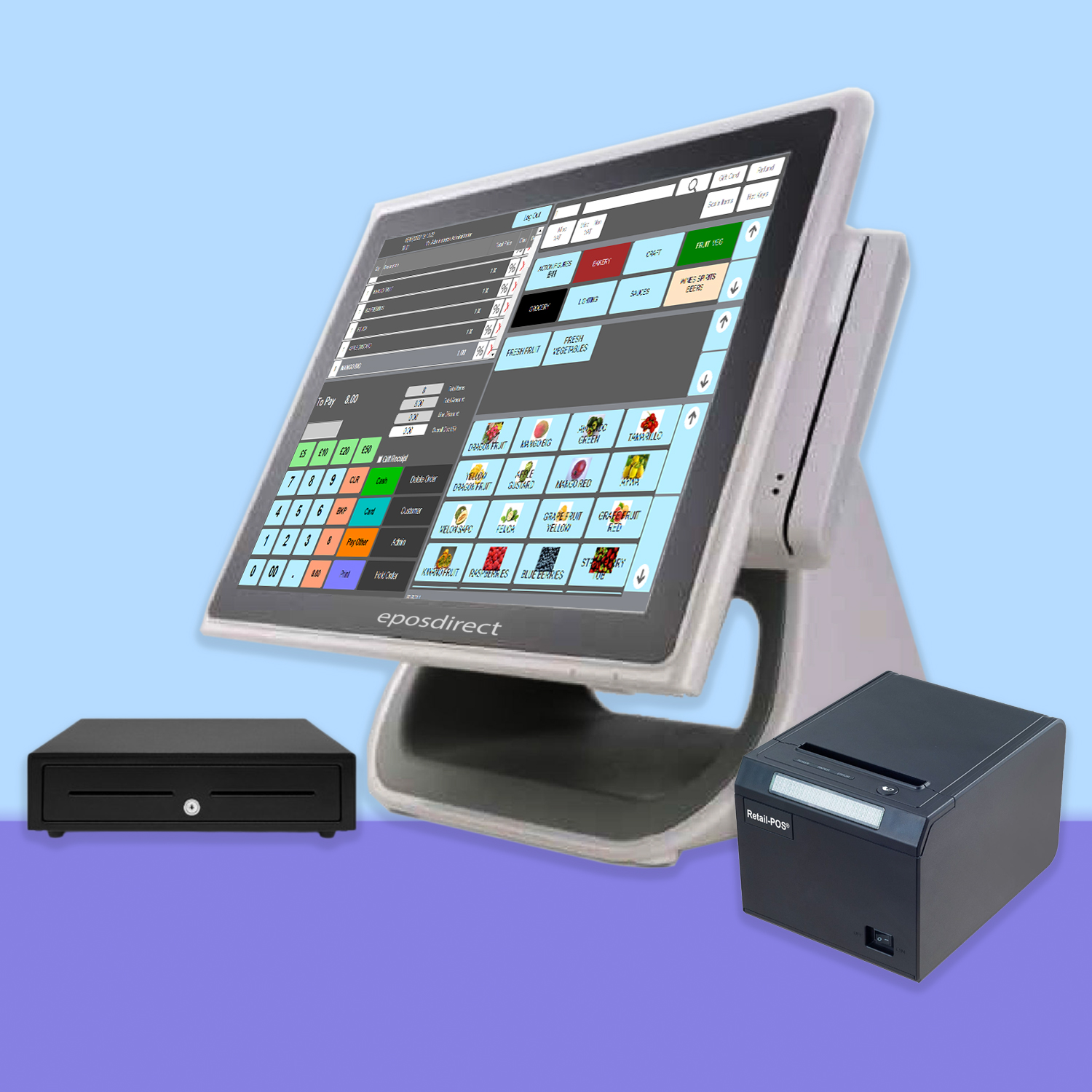
EPOS Direct is an EPOS vendor in the UK, offering both hardware and software bundles. This POS provider focuses on hospitality, grocery, pharmacy, and retail. EPOS Direct also provides integrations with eCommerce platforms, such as Magento, Shopify, and WooCommerce.
Features
- Track stock levels, set reorder points, and manage products across all locations
- Monitor sales performance and analyze customer buying patterns in real time
- Build customer database, track purchase history, and run loyalty programs
- Track employee hours, set permissions, and monitor performance
- Generate detailed reports on sales, inventory, and staff performance
- Integrate with Magento, Shopify, and WooCommerce to sync data between online and offline stores
- Accept contactless, chip-and-pin, and mobile wallets
- Manage multiple stores or warehouses through a centralized dashboard
Pros
- Offer UK-based support
- Offer hardware + software packages and free installation
- Provide Magento EPOS Direct integration, so merchants don’t need to find a 3rd-party connector
Cons
- Require extra costs of £699 + VAT for Magento and EPOS integration
- Only sync basic product information, such as product title, description, pricing, quantity, categories, and tags, between EPOS Direct and Magento
- Only run on the Windows operating system
Recommended for
- Retailers seeking a vendor-supported hardware and software bundle who prefer local support and operate exclusively on Windows.
How to choose the right EPOS for Magento
Here are essential practical steps with self-check questions and criteria to help you pick the right system for your business:
1. Define your business needs
- How many physical locations? One, two, or a chain?
- SKU count, inventory complexity (bundles, kits, variants vs simple items)
- Do you offer store fulfilment, click and collect, or ship-from-store?
- What payment methods do you support (UK contactless, e-wallets, gift cards)?
- Do you need offline mode?
- What are your growth plans for the next 2-3 years?
2. Evaluate Magento-integration depth
- Ask: Does the POS integrate directly with Magento or require a connector to connect with the platform?
- Native typically means fewer sync issues and custom bridges.
- Check compatibility with Magento versions: e.g., Magento 2.4.x
- Test order, stock, and customer data sync in real-world scenarios
3. Ensure UK-specific compliance and support
- Can the EPOS specify VAT and tax rules per product, store, or transaction?
- Are payment methods supported: Chip & PIN, contactless, and e-wallets, with PCI compliance?
- Is local UK support available (UK time zone, UK client base) for faster issue resolution?
4. Review hardware and scalability
- Does the EPOS work with your current hardware (scanners, tills, tablets)?
- Can the POS hardware scale easily across multiple stores and outlets?
- What’s the cost per device or store?
- Does offline mode exist (so your till works even if the internet drops)?
5. Compare cost vs value
- Which pricing model do you prefer: one-off licence, subscription, or device-based pricing?
- What extra costs might arise from customisation, hardware, payment gateways, connectors, or addons?
- What is the total estimated cost, including devices, licences, integrations, and support?
- Are updates, training, offline backup, and sufficient support (responsive, timely, and effective) included?
6. Future-proof your operations
- Beyond core features: loyalty programmes, tier-pricing, advanced promotions, omnichannel fulfilment
- Ability to customise or add modules later
- Reporting and analytics: You’ll want visibility for growth
- Check user reviews for long-term reliability
7. Request demos and trials
- Try the system with your real store data if possible (or dummy SKU set)
- Simulate complex scenario: offline mode, network drop, returns, multi-location transfer
- Talk to other UK merchants using the system (especially Magento merchants)
8. Make the decision aligned with your strategy
- Choose the Magento EPOS that best balances features, scalability, and total cost of ownership with your strategic goals
- Ensure it supports UK compliance and customer expectations
- Confirm vendor support and roadmap align with your growth plans
Conclusion
Choosing the best EPOS for Magento 2 depends on your store size, selling channels, and growth goals. The right EPOS software for Magento should fit your operations today while remaining flexible enough to scale tomorrow – keeping your inventory, customers, and sales seamlessly connected with Magento.
If you want a fully Magento-native solution that syncs data in real time across online and offline stores, Magestore POS stands out as the most complete option.
Contact us to explore a best-fit Magento EPOS system for your business!
FAQs
What are EPOS systems?
The EPOS system comprises POS hardware and software that businesses can utilize to manage in-store checkout, track sales, customers, and inventory. An omnichannel EPOS solution can efficiently handle both in-person and online sales, allowing merchants to manage all data on a single platform.
How to integrate EPOS with Magento?
If you use a Magento-native EPOS like Magestore, you can go live instantly, no external integration or data syncing setup needed, since it runs directly on your Magento system.
If you’re using a standalone EPOS, choose one that’s Magento-compatible, install its connector, or hire an integration service. Then, map your product, order, and inventory fields, and test the syncing to ensure everything runs smoothly.
What is the best EPOS for Magento?
The best EPOS for Magento shops depends on your business needs. Magestore is the No.1 EPOS for Magento, offering real-time sync, full inventory control, and strong omnichannel features for retailers.
Is Epos Now for Magento?
Yes and no. Epos Now supports Magento through a third-party connector, but doesn’t offer a fully native, out-of-the-box integration for Magento. Syncing may require additional setup and might not occur in real time.
